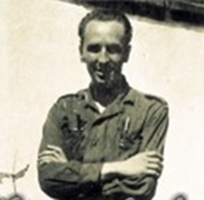Henri H. Stahl (b. 1901, Bucharest – d. 9 September 1991, Bucharest) was one of the most respected sociologists in Romania, a member of the so-called Bucharest School of Sociology, which, in the interwar period, developed under the guidance of Dimitrie Gusti the method of monographic study of villages with the help of a multidisciplinary team. At the same time cultural anthropologist, social historian, and rural sociologist, Henri H. Stahl became a key name in each of these fields. He was the son of the writer and historian Henri Stahl, who is known for his creation of an original system of shorthand and for founding the Romanian schools of graphology and palaeontology. The same family of Alsatian-Swiss origin, an unusual background even for pre-war Bucharest, produced another two very well-known intellectuals of the interwar period: the novelist Henriette Yvonne Stahl and the theoretician of social democracy Şerban Voinea, sister and half-brother respectively of Henri H. Stahl. Having graduated from the Faculty of Law in 1921, Stahl began his collaboration with the founder of Romanian sociology, Dimitrie Gusti, in 1930. As part of the famous monographic teams that roamed the villages of Romania, he made his mark as one of Gusti’s closest and most creative collaborators, working as his assistant in the Department of Sociology, Ethics, and Politics of the Faculty of Letters and Philosophy of the University of Bucharest. As a sociologist, he published numerous studies, especially about rural sociology, but also regarding methods of sociological investigation. In 1943, he moved to the newly founded Department of Rural Sociology, before going on to become head of the Department of General Sociology.
In 1948, with the full installation of the communist regime in Romania, the study of sociology was forbidden because the discipline was considered a “bourgeois subject.” Consequently, Henri H. Stahl was forced out of teaching, despite the fact that he was among the few genuine leftist intellectuals in Romania. As he himself put it, his convictions were purely theoretical and not political; in any case, their origins lay in Marxist tendencies, but not in Bolshevism: “I was convinced that historical materialism was an admirable tool of scientific research, but that was all. I wasn’t even particularly enthusiastic as a socialist. Kautskyist, Kautskyist, but I had read Bernstein too, not to mention many others as well. I was very impressed by Proudhon, by the French communist socialists; I wasn’t at all convinced that Marx was right when he said that we would inevitably arrive at a socialist society. And in any case, I wasn’t at all convinced that a socialist society would look like what the Bolsheviks wanted. I couldn’t go along with that business. […] I was up-to-date with all these debates. And I was convinced that the social democrats were right. Kautsky was for me a great teacher. […] Indeed that was one of the faults that was held against me when I was judged and put out of the Communist Party. As a social democrat, I was passed to the communists, and there I was judged and thrown out” (Rostás 2000, 14).
After being purged from the University, he had to work at the Institute of Urbanism in a marginal professional capacity, as a technical draftsman, until 1956, when he was forced to take early retirement. It was only ten years later, in 1966, after the reintroduction of sociology as a section of the Faculty of Philosophy, that he was called back to teaching. Starting from this period, he contributed to the revival of Romanian sociology, within frameworks well coordinated and controlled by the Romanian Communist Party, together with Miron Constantinescu, himself an important figure both in the political circles of the first three decades of Romanian communism and in academic circles. At the same time he had the opportunity to publish extensively on themes regarding rural sociology and research methods and techniques. Particularly deserving of mention is the volume Amintiri şi gânduri din vechea şcoală a monografiilor sociologice (Memories and thoughts from the old school of sociological monographs) (1981). This was initially rejected for publication in the format of a history of Dimitrie Gusti’s sociological school including a contribution by Traian Herseni, Stahl’s former colleague in the teams carrying out monographic studies of villages, an intellectual of the extreme right between the wars and a former political prisoner under communism. After Herseni’s death, however, Stahl managed to publish his contribution to this history in the form of a memoir under the title mentioned above. In view of this example of differentiated treatment of authors, it may be said that in the Ceaușescu period Henri H. Stahl’s pre-communist leftist convictions contributed to his rehabilitation by the regime. In 1969, he was elected a member of the Academy of Social and Political Sciences, and, from 1974 he was a corresponding member of the Romanian Academy. It was only after the fall of communism that he became a full member of that institution, in 1990. He was also a Chevalier of the Legion of Honour.

